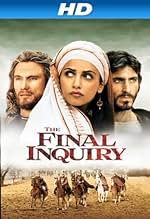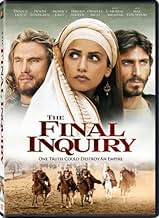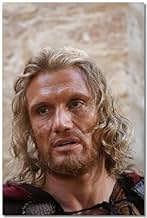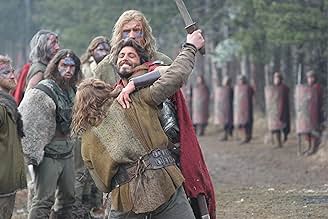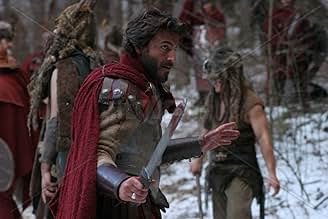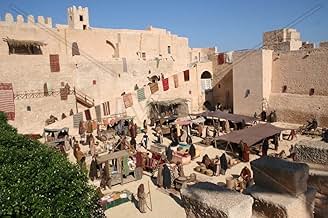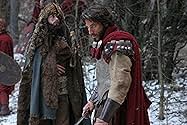NOTE IMDb
5,3/10
1,5 k
MA NOTE
En l'an 35, un tribun romain est envoyé en Palestine pour enquêter sur la mort et l'éventuelle résurrection de notre Seigneur Jésus de Nazareth.En l'an 35, un tribun romain est envoyé en Palestine pour enquêter sur la mort et l'éventuelle résurrection de notre Seigneur Jésus de Nazareth.En l'an 35, un tribun romain est envoyé en Palestine pour enquêter sur la mort et l'éventuelle résurrection de notre Seigneur Jésus de Nazareth.
- Réalisation
- Scénario
- Casting principal
- Récompenses
- 2 victoires au total
Avis à la une
The basic motif to see it was Max von Sydow. Unfortunatelly, he remains the only one. Because, not being real bad, it has the unluck to be a grey one, easy to ignore, easy to critic, easy to see it as remind of Quo Vadis , for Ursus becoming Brexus, for Taurus. The story remains conventional and, not so good, totally predictable. The acting is like the story - without spices or some salt. The love story sounds nice. But it only sounds. The life of first Christians and the effort of poor Tito Valerius for conquest the truth are decent points and the presence of the two Bulgarian actors reminds The Passion of Crist, another reasonable good point.
Short, a Christian film, modest but far to be awfull, well intentioned, having desire to have some targets - the cast remains the clue in this sense - but not being more than modest and decent.
Short, a Christian film, modest but far to be awfull, well intentioned, having desire to have some targets - the cast remains the clue in this sense - but not being more than modest and decent.
When I got this movie it had quite a low score here on IMDb. But the subject seemed to be interesting, it was not an Hollywood production and had at least one big name in the paylist - Max von Sydow's. So I took the challenge and gave it a try. Big mistake... Though it's screenplay is written with some interesting plots and with quite an original ideas for a Jesus-related movie this is almost the only thing worth to be praised here.
The first thing you will notice is the music of someone, who's surname is Moricone but his not "the one" but some other Moricone. So is his music - kind of Moricone's style but not "the one" - something is missing, it's to loud and generally does not fit.
Then you will notice the performers and they certainly can help to forget about poor music since they performance is really stunning. Literatim. It's something like operetta filmed in the silent movie period with all those exalted movement and acting typical for those old times. Moreover my version was apparently dubbed in English although the movie was apparently made in English at the first place! I do not know why they did it - maybe some Italian actors had some problems with the language but then if you add voices to a already finished movie it is never perfect and the effect is rather ridiculous. Combined with aforementioned style of acting it looks just utterly stupid. And if this was not enough some of supporting roles are seemed to be written for computer RPG characters! You know, like for example those typical NPCs standing next to the town gates only to say something like "welcome to Jerusalem"... Some dialogues between those characters seemed o be intentionally written in Monthy Python style...
But apart from that there is also an actor there who really stands out - Dolph Lundgren! By far it is the best of his performance I had a "pleasure" to watch. Of course as every barbarian he speaks with Scottish accent witch is really sweet, especially that he apparently is trying to imitate Sean Connory... Since he plays a barbaric Germanic warrior and he has not much to do there apart from being "strong, noble and wild" and of course of swinging his enormous axe everywhere. The movie is full of scenes where Lundgren is shown somewhere in the background or foreground performing this complicated tasks and I must admit he had really mastered it. Seriously - for someone who's performing talent is so, well, narrow I think he is a real star in this movie.
Some say "there is no good movie without a love story plot". But this one could be definitely better without. I had mentioned before about some interesting and original ideas in the scenario but this is only to be observed in the first half of the movie. The second half is devoted mainly to love story plot and this just kills this otherwise would-be-weak-but-not-the-worst movie. It's just dull and absurd in the world of this picture and moreover it is completely redundant.
See for yourself if you dare but there are better ways of spending time.
The first thing you will notice is the music of someone, who's surname is Moricone but his not "the one" but some other Moricone. So is his music - kind of Moricone's style but not "the one" - something is missing, it's to loud and generally does not fit.
Then you will notice the performers and they certainly can help to forget about poor music since they performance is really stunning. Literatim. It's something like operetta filmed in the silent movie period with all those exalted movement and acting typical for those old times. Moreover my version was apparently dubbed in English although the movie was apparently made in English at the first place! I do not know why they did it - maybe some Italian actors had some problems with the language but then if you add voices to a already finished movie it is never perfect and the effect is rather ridiculous. Combined with aforementioned style of acting it looks just utterly stupid. And if this was not enough some of supporting roles are seemed to be written for computer RPG characters! You know, like for example those typical NPCs standing next to the town gates only to say something like "welcome to Jerusalem"... Some dialogues between those characters seemed o be intentionally written in Monthy Python style...
But apart from that there is also an actor there who really stands out - Dolph Lundgren! By far it is the best of his performance I had a "pleasure" to watch. Of course as every barbarian he speaks with Scottish accent witch is really sweet, especially that he apparently is trying to imitate Sean Connory... Since he plays a barbaric Germanic warrior and he has not much to do there apart from being "strong, noble and wild" and of course of swinging his enormous axe everywhere. The movie is full of scenes where Lundgren is shown somewhere in the background or foreground performing this complicated tasks and I must admit he had really mastered it. Seriously - for someone who's performing talent is so, well, narrow I think he is a real star in this movie.
Some say "there is no good movie without a love story plot". But this one could be definitely better without. I had mentioned before about some interesting and original ideas in the scenario but this is only to be observed in the first half of the movie. The second half is devoted mainly to love story plot and this just kills this otherwise would-be-weak-but-not-the-worst movie. It's just dull and absurd in the world of this picture and moreover it is completely redundant.
See for yourself if you dare but there are better ways of spending time.
If you enjoy Biblical film, you should enjoy this and add it to your collection. I'm not sorry I purchased it. Lundgren & Liotti are fabulous to look at and Monica Cruz is no slouch either (she looks just like her sister, Penelope).
The story-line is great. I wonder where the "Goofs" section is under "Fun Stuff" on IMDb, as this film was not devoid of them. For example, the rolling away of the massive stone at the tomb of Lazarus. It was done by one guy while another stood with a piece of lumber to assist by prying it but really did nothing, which would not have been possible. Some of the fight scenes just looked very badly done. There was a kiss scene wherein saliva strung from one person to another that would have been much more watchable had that been edited out. Finally, at the end, the terrain was striped by tire tracks and what looked like a radio tower on a mountain top.
The story-line is great. I wonder where the "Goofs" section is under "Fun Stuff" on IMDb, as this film was not devoid of them. For example, the rolling away of the massive stone at the tomb of Lazarus. It was done by one guy while another stood with a piece of lumber to assist by prying it but really did nothing, which would not have been possible. Some of the fight scenes just looked very badly done. There was a kiss scene wherein saliva strung from one person to another that would have been much more watchable had that been edited out. Finally, at the end, the terrain was striped by tire tracks and what looked like a radio tower on a mountain top.
First, I was unaware that this was a re-make. If the first movie is on DVD, I'll try it to see any difference. As to this movie (2006), I am going to write my usual bug-aboo about historical accuracy and the movies.
I wish just once that a film set in the period of Yeshua/Jesus would depict the Jewish people with a less than jaundiced - read: historically inaccurate - eye. I was confronted at the very opening of this film with yet another scene of "crazed Jews" stoning a woman for adultery. According to some extensive research on this period, I have learned that the imposition of the death penalty in ancient Jewish society was rare and could only be undertaken under very controlled conditions. For example, a woman caught in adultery was not automatically put to death. Both she and her husband had to appear before the Great Sanhedrin in Jerusalem - and only this body, with the consent of every single member, could actually pronounce the death sentence. One "no" vote and there was an acquittal. The husband could forgive his wife and take her back and that was the end of it. Or he could divorce her. If she was freed and committed adultery again, then the matter would be returned to the High Court. Trials took three days: testimony and evidence on the first day; deliberation by the court on the second, and the third day reserved for the verdict. This third day was meant as a "cooling off period" to avoid a rush to judgment. The sentence upon conviction was not always death. None of this "crazed outrage" in the streets followed by an angry stoning as depicted in this film. It is also said that any Sanhedrin that passed two death sentences within 7 years was called a "bloody Sanhedrin." In other words, the Jewish people had made a deliberate attempt to provide justice in an orderly and civilized way. To depict them as simply a bunch of "crazies" running about the streets like blood-crazed savages is nothing more than pure propaganda.
One other note on the trial, each member of the court had a small pebble - a stone - that they tossed (cast) into a large pot. The stones were then counted to reach a verdict. This is what is meant by the phrase: "Let those among you who are blameless (without malice; pure of heart) cast the first stone."
Further, no Sanhedrin would meet to hold a "trial" - especially one involving a potential death sentence - within three days BEFORE and three days AFTER a religious holiday. This is because of the three-day trial concept. Therefore, Jesus couldn't be tried and convicted on the same day.
As far as this movie is concerned, it is a standard Christian story told with some reverence for the faith, although it is not entirely original in it's story line. Compare it with "The Robe" (1953) where a Roman soldier (Richard Burton) is sent by the Emperor Tiberias to find the "true" story of what happened in Jerusalem. That Roman is cynical at first but, through the miracle of Peter saving a young woman (played then by Debra Paget), the soldier converts to Christianity.
I wish just once that a film set in the period of Yeshua/Jesus would depict the Jewish people with a less than jaundiced - read: historically inaccurate - eye. I was confronted at the very opening of this film with yet another scene of "crazed Jews" stoning a woman for adultery. According to some extensive research on this period, I have learned that the imposition of the death penalty in ancient Jewish society was rare and could only be undertaken under very controlled conditions. For example, a woman caught in adultery was not automatically put to death. Both she and her husband had to appear before the Great Sanhedrin in Jerusalem - and only this body, with the consent of every single member, could actually pronounce the death sentence. One "no" vote and there was an acquittal. The husband could forgive his wife and take her back and that was the end of it. Or he could divorce her. If she was freed and committed adultery again, then the matter would be returned to the High Court. Trials took three days: testimony and evidence on the first day; deliberation by the court on the second, and the third day reserved for the verdict. This third day was meant as a "cooling off period" to avoid a rush to judgment. The sentence upon conviction was not always death. None of this "crazed outrage" in the streets followed by an angry stoning as depicted in this film. It is also said that any Sanhedrin that passed two death sentences within 7 years was called a "bloody Sanhedrin." In other words, the Jewish people had made a deliberate attempt to provide justice in an orderly and civilized way. To depict them as simply a bunch of "crazies" running about the streets like blood-crazed savages is nothing more than pure propaganda.
One other note on the trial, each member of the court had a small pebble - a stone - that they tossed (cast) into a large pot. The stones were then counted to reach a verdict. This is what is meant by the phrase: "Let those among you who are blameless (without malice; pure of heart) cast the first stone."
Further, no Sanhedrin would meet to hold a "trial" - especially one involving a potential death sentence - within three days BEFORE and three days AFTER a religious holiday. This is because of the three-day trial concept. Therefore, Jesus couldn't be tried and convicted on the same day.
As far as this movie is concerned, it is a standard Christian story told with some reverence for the faith, although it is not entirely original in it's story line. Compare it with "The Robe" (1953) where a Roman soldier (Richard Burton) is sent by the Emperor Tiberias to find the "true" story of what happened in Jerusalem. That Roman is cynical at first but, through the miracle of Peter saving a young woman (played then by Debra Paget), the soldier converts to Christianity.
I want to comment on what someone already said.
The comment was upset at treatment of Jewish practice portrayed in the film. However, the rules on adultery and trials, well ... if you want to be upset, be upset at the gospels.
The gospels portrayed the trial as a crooked rush job. Likewise, the stoning for adultery (and in the past, rural areas did not always strictly follow the dictates of the law) was referenced in a favorite scene in the Bible as well. The Bible had no "backstory" underlining that really the stoning in practice was a last result and rarely done practice. We were meant to see it as barbaric, the crowd driven more by passion than reason (before Jesus came around to guilt them).
In fact, some gospels had various scenes that put Jewish practice in bad light. At times unfairly. For instance, the money-changing in the temple -- you needed that to allow people from all over to have the right sort of coin to give their offering. It surely had some bad flavor, but it was not just about a "band of thieves." Lashing out like Jesus did kinda suggests why some thought the guy a tad bit dangerous especially in an age of rebels and revolts.
If one wants a "historical" reflection of what "actually" happened, which honestly would be not a bad way to go, they wouldn't be as reliant on scripture and all. The conceit of this movie also would not really be possible, to be totally honest about it.
The comment was upset at treatment of Jewish practice portrayed in the film. However, the rules on adultery and trials, well ... if you want to be upset, be upset at the gospels.
The gospels portrayed the trial as a crooked rush job. Likewise, the stoning for adultery (and in the past, rural areas did not always strictly follow the dictates of the law) was referenced in a favorite scene in the Bible as well. The Bible had no "backstory" underlining that really the stoning in practice was a last result and rarely done practice. We were meant to see it as barbaric, the crowd driven more by passion than reason (before Jesus came around to guilt them).
In fact, some gospels had various scenes that put Jewish practice in bad light. At times unfairly. For instance, the money-changing in the temple -- you needed that to allow people from all over to have the right sort of coin to give their offering. It surely had some bad flavor, but it was not just about a "band of thieves." Lashing out like Jesus did kinda suggests why some thought the guy a tad bit dangerous especially in an age of rebels and revolts.
If one wants a "historical" reflection of what "actually" happened, which honestly would be not a bad way to go, they wouldn't be as reliant on scripture and all. The conceit of this movie also would not really be possible, to be totally honest about it.
Le saviez-vous
- AnecdotesWas conceived as both a theatrical film and a TV movie.
- GaffesIn the early scene in which Tito Valerio Tauro leaves Tiberius on the isle of Capri, the film is being run backwards because the fire and smoke on the upper right of the scene is going into the fire, not up and away from it .
- Versions alternativesThere are two versions of the film, a theatrical one (112') and a TV one in two parts (190' - 95' each). The extended version premiered on Italian and is available on the Czech DVD edition. The TV version is highly recommended due to its complete script with a larger cast of relevant characters, which increases plot weight and eases the story understanding. Apart of some characters, a few secondary outlines appear despite of the cinema version. Sometimes, the short version seems to be cut off, but some viewer's questions may be shown are fully solved in the most amusing TV version.
- ConnexionsFeatured in Making of 'The Inquiry' (2007)
Meilleurs choix
Connectez-vous pour évaluer et suivre la liste de favoris afin de recevoir des recommandations personnalisées
- How long is The Final Inquiry?Alimenté par Alexa
Détails
- Date de sortie
- Pays d’origine
- Site officiel
- Langues
- Aussi connu sous le nom de
- The Final Inquiry
- Lieux de tournage
- Bulgarie(opening)
- Sociétés de production
- Voir plus de crédits d'entreprise sur IMDbPro
Box-office
- Budget
- 8 000 000 € (estimé)
- Montant brut mondial
- 249 610 $US
- Durée
- 1h 52min(112 min)
- Couleur
- Mixage
- Rapport de forme
- 1.85 : 1
Contribuer à cette page
Suggérer une modification ou ajouter du contenu manquant


